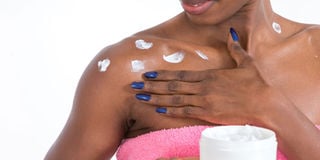Prime
The dangers of bleaching

What you need to know:
- Skin lightening procedures block the mechanisms by which melanocytes make skin colour (melanin). Lessened melanin puts one at risk of skin cancer.
Skin bleaching in Africa started during the colonial era but has become a public health concern causing adverse effects ranging from skin diseases to serious systemic problems such as diabetes, hypertension, skin cancer, infertility and renal diseases.
The cosmetic procedure is aimed at lightening dark areas of the skin in order to achieve a lighter tone. The bleaching products contain chemicals that work by blocking the mechanism by which melanocytes make skin colour.
Bleaching can be achieved through the use of creams, soaps, pills, chemical peels and laser therapy. It must be noted that there is no method recognised as a safe way to lighten skin.
Steven Karanja says his 16-year-old daughter started using a skin toning crème in December last year. As a teenager, when she developed acne, friends advised her to use the lotion to clear the acne. And when she started using it, she did not suffer immediate effects.
“I took my daughter to different hospitals because she had developed wounds on the lips and patches on the hands and her entire body. At first I thought it was a fungal infection but the doctor said it was not. She was in so much pain and the reaction worsened every day,” he says.
When Karanja took her to a dermatologist, he was advised to check the cosmetic products his daughter was using.
“I took the body lotion to the government laboratory in Wandegeya, Kampala, and after tests, I was told that the crème contained an illegal ingredient referred to as clobetasol. I was also told that the amounts of clobetasol in the crème should not be used on any type of skin,” he says.
How safe are you?
Dr Ibrahim Mukalazi, a dermatologist at Mildmay Hospital in Kampala says clobetasol is a steroid used to treat itching, redness, dryness, crusting, scaling, inflammation and discomfort caused by various scalp and skin conditions, including psoriasis and eczema.
“It must be applied over a small area of the skin for a short period of time under the supervision of a doctor. Prolonged use can cause adverse allergic reactions such as a skin rash, burning, stinging, swelling, or irritation on the skin and could make one’s skin thinner or cause stretch marks,” Dr Mukalazi says.
Besides clobetasol, there are several other ingredients in many cosmetic products that are harmful according to Dr Mukalazi. They include mercury, hydroquinone, arbutin, alpha hydroxy acids, kojic acid, licorice and betamethasone.
“One should read cautiously and see if the cosmetic products they are buying or using contain any of the above ingredients, which can cause adverse effects such as infertility, kidney problems and skin cancer.
Sylvia Kirabo, the Uganda National Bureau of Standards (UNBS) spokesperson, says there are standards for cosmetics and on their website, under market surveillance, there is a list of banned cosmetics.
“Cosmetics are governed by a number of Uganda Standards including Uganda standard (US EAS 377-1:2013), which states that there shall not be any hydroquinone or mercury in cosmetics to be used for skin applications and that only two percent hydroquinone is permissible for cosmetics to be used on hair,” she says.
On January 15, UNBS issued a press statement maintaining the ban on cosmetics that contain mercury and hydroquinone in Uganda.
A survey done by UNBS indicates that 31 percent of the samples brought from the market and tested in UNBS’ internationally accredited laboratories were found to contain hydroquinone, contrary to the requirements of US EAS 377-2:2013 and most of these were imported products.
“Some of the imported products were labelled as containing hydroquinone, though written as Benzene-1, 4- diol; 1, 4 hydroxy benzene; 1, 4-Benzenediol or Benzene-1, 4-Diol. Others do not declare at all, which is harmful to unsuspecting clients,” reads part of the statement.
Hydroquinone and mercury are common active ingredients found in a number of skin care products, designed specifically to lighten or bleach the skin.
However, research has established that hydroquinone is a carcinogenic or a cancer causing chemical that has also been linked to ochronosis, a medical condition where the skin becomes dark and thick.
The World Health Organisation (WHO) also states that mercury, a key ingredient in most of the skin care products, causes kidney and skin damage, rash and reduces the skin's ability to resist bacterial and fungal infections.
Why use lightening creams?
Many people world over, men and women use lightening creams for several reasons. While some may use the creams as treatment for skin problems such as freckles, acne and chicken pox scars or anti-aging, others use them on the entire body to bleach.
"There are some skin conditions that affect people because of their age. Acne is sometimes seen as a problem that plagues teenagers but adults too can get it. It is important to know what triggers it in order to know how to fight it. You should not let acne define you because dermatologists can treat it," Dr Mukalazi says.
He explains that this skin problem starts when oil and dead skin cells clog hair pores on the skin, creating a suitable environment for bacteria to grow, leading to pain, swelling, redness and pus (pimples). They may also cause bulging of the pore as a black or white head.
Acne usually appears on the face, chest, shoulders and back since these areas of the skin have several sebaceous glands. Seasonal acne can go away on its own but in some people, it is a hormone problem that tends to be chronic.
Acne usually gets better with age. Although acne is not a serious health risk, it can cause permanent scars and damage one’s self-esteem. There are safe treatments by dermatologists but sometimes may require a change of lifestyle.
There are, however, situations when lightening creams are recommended for medical use according to Dr Malik Ssempereza, a dermatologist at Unity Skin Clinic at Acacia Mall in Kampala.
“For example, when a person has had eczema, chicken pox or acne patches, we can recommend a particular cream with specific ingredients but it must be used for a few weeks and under the supervision of a doctor,” he says.
Complications
Skin lightening procedures block the mechanisms by which melanocytes make skin colour (melanin). The more melanin produced, the darker the skin and the lesser melanin the brighter the skin colour.
“Lessened melanin puts people using lightening creams at risk of skin cancer since melanin acts as a natural sunblock that protects the skin from ultra violet rays of the sun and provides a sun protection factor,” Dr Ssempereza says.
The amount of melanin a person has depends on the genetic mechanism but its production can be affected by injuries such as burns, exposure to sunlight, hormones and exposure to certain chemicals.
Prolonged use of the creams can contribute to premature aging of the skin. Also, the steroids in some skin lighteners may increase one's risk of skin infections, skin thinning, acne, and poor wound healing.
Beauty tip
Sleeping with your makeup on is likely to cause long-lasting damage to your skin in the long run. The pores become more clogged and your skin becomes more vulnerable to early aging.
Leaving makeup on your skin overnight can clog the pores and not allow the skin to breathe. This can cause unevenness of your colour tone, acne, dryness and faster aging of your skin.”
Dr Ssempereza says one must make sure they remove even mascara because it can clog the tiny hair follicles in your eyelids. The clogging can further cause irritation, inflammation, or even eye cysts.
“Leftover eye shadow clogs the oil glands and hair follicles on your eyelids causing infections such as styes. When you sleep in your mascara or eyeliner, it can get into your eyes and cause irritation. The mascara may flake off, causing breaking and falling off of your eyelashes,” he adds.
It is important to read the instructions such as washing hands after using some medical cosmetics.




